AVLFest: Was the inaugural citywide music festival a success?
ASHEVILLE - Anything can throw an event off-course, especially when attempting to introduce a new concept in uncharted venues and without previous proof of experience.
Organizers for the inaugural AVLFest, presented by Wicked Weed Brewing and Worthwhile Sounds, understood this when preparing for the music festival’s launch, Aug. 3-6. It also was agreed that the event had to make a great first impression and not hold back, thus the 16 venues hosting 230 shows over a four-day window.
“One of the things about doing it over four days was making as big of an impact as possible and having as many acts as possible and showcasing as many local bands, regional bands, and even national touring bands – and making a big deal out of it,” said Jeff Whitworth, founder and owner of Worthwhile Sounds. “To get the footing for our long-term vision, we knew we had to come out of the gate really strong in year one and we had to do it right.”
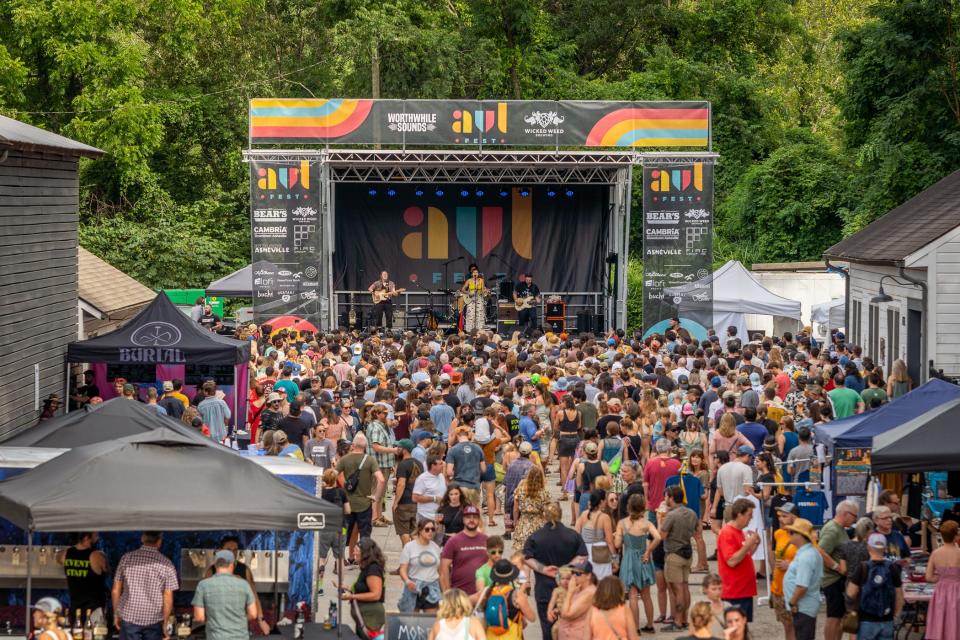
There was skepticism mixed with excitement from the public following the announcement of the citywide event earlier this year, and for valid reasons.
Wicked Weed Brewing is known for its craft beer, but despite presenting small-scale shows at its taprooms, the Asheville-based brewery hadn’t been a driving force of a large-scale music festival series.
And although Whitworth had experience in the music industry and concerts as the former co-owner of The Grey Eagle for 12 years from 2004-2016, curating a new multiday, citywide event was an enterprise he’d yet to attempt.
Yet, Wicked Weed Brewing and Worthwhile Sounds collaborated to co-found AVLFest to bring a vision to fruition that would showcase local, regional and national talents on stages across Asheville.
“It was a massive undertaking, and we knew it from day one. There were certainly questions along the way, like ‘Are we going to be able to do this?’” Whitworth said. “I think we were all confident. One of the things that we had to our advantage was the built-in infrastructure of our amazing venues. I knew from being a former venue owner and in and out of all these venues, I knew the venues could handle it, and once we started on Thursday, we were at the mercy of the venues and the production staff and front of house staff.”
Worthwhile Sounds, established in 2015, acts as an independent talent-buying organization that represents music entities including The Grey Eagle, Asheville Downtown Association’s Downtown After 5, and Burial Beer Co.’s Burnpile Harvest Festival.
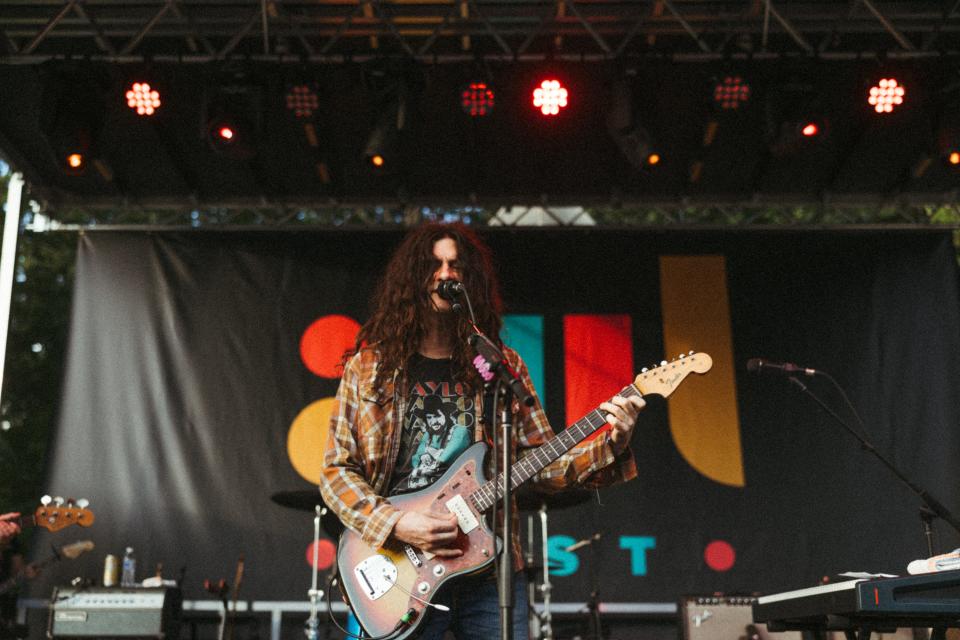
Whitworth’s career experience and personal affinity for music and festivals combined with Wicked Weed team's aptitude for hosting large audiences and curating events and concerts, along with the help of many staff and volunteers and partners across the city made AVLFest’s debut a success.
“Leading up to the festival, we had more of the skepticism, and I think the community, rightfully so, were like, ‘What is this? How is it going to function?’” said Rachel Dudasik, Wicked Weed’s community engagement and communications manager. “I’d say 99.9% of the feedback we got is, ‘Whoa, I don’t know how y’all just did that.' Our answer is a lot of planning, and neither do we.”
The inspiration for AVLFest
AVLFest venues included concert halls, bars and breweries, like Wicked Weed’s Funkatorium, The Grey Eagle, Salvage Station, Highland Brewing, The Orange Peel, Asheville Music Hall, Funkatorium, Fleetwood’s, 27 Club, and Burial Beer’s Forestry Camp.
For decades, Whitworth has desired to launch a citywide music showcase in Asheville.
“I’ve long been involved with the music and venue scene here in Asheville. This has always been a vision and dream to do something citywide like this,” Whitworth said. “Asheville’s such a great, unique, wonderful town for many reasons, but the thing that drew me to Asheville was the music scene. I came here to see a show in 1999, walked into the door at The Grey Eagle and knew there’s where I wanted to spend the rest of my life for better or for worse. I was always drawn here for the music. The local music scene here, the venues, everything about Asheville spoke to me.”
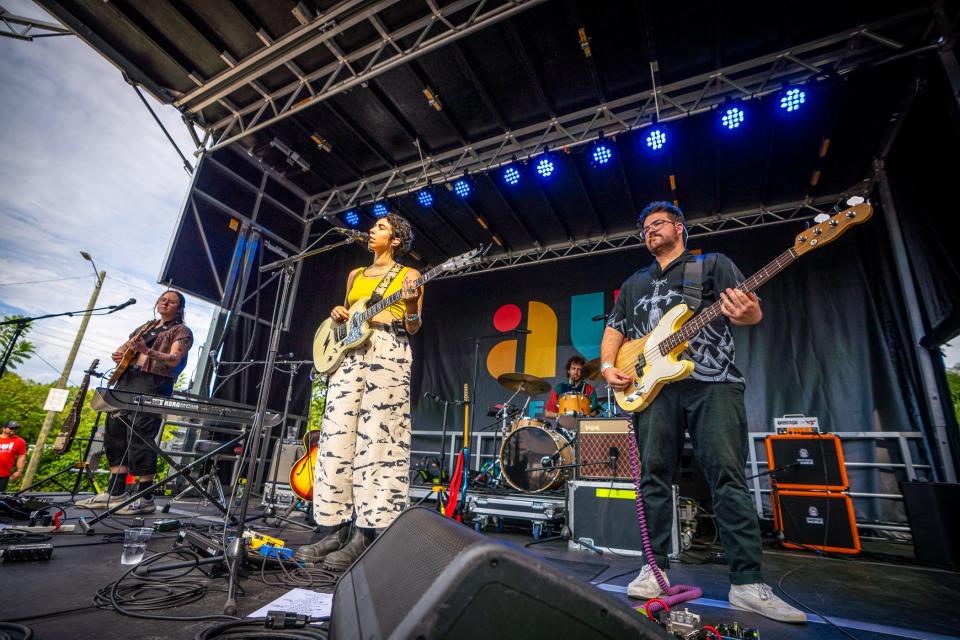
AVLFest was compared to other music festivals, like Asheville’s Bele Chere and Moogfest, which are no more.
“There were obviously lots of comparisons to Bele Chere early on, but I think we blew all those up this weekend,” Whitworth said.
The previous successes of those events were evidence that the city had the foundation for another music festival.
“It was a thing that had to happen, and I think the community has been waiting for such a long time for something like this to come back,” Whitworth said.
Some compared it to South by Southwest’s music festival series in Austin, Texas, which is the most accurate.
Whitworth has attended SXSW multiple years, and it inspired the model of AVLFest, he said.
In 2004, Whitworth said that he and a former business partner pitched launching a South by Southeast arm of the Austin series, but the idea never moved forward.
Local entrepreneur Bryan Matheny approached Whitworth with the idea to introduce a citywide festival, and Whitworth responded that he already had a blueprint for one that fit Asheville.
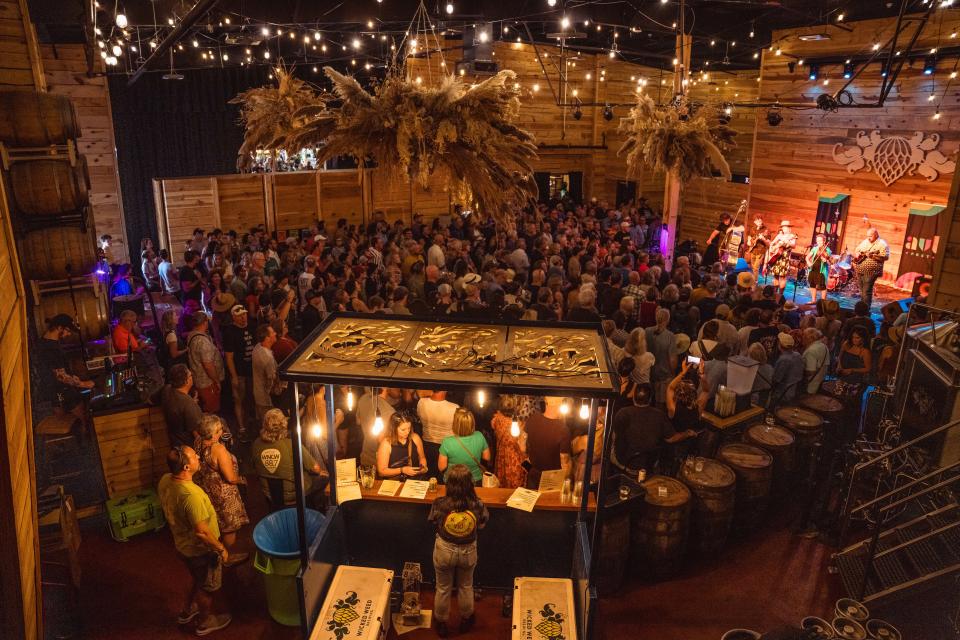
“We had a shared vision in that regard as far as something that could really encapsulate every venue in the city and make the most of everything had to offer. Our shared vision ended up here,” Whitworth said.
AVLFest was designed to have its own identity that reflects Asheville’s current scene. One big difference Whitworth wanted was to keep music at the event’s core, as opposed to how SXSW has steadily evolved from a concert series to include film, television and comedy components.
“It’s become more of a conference than a music showcase festival,” Whitworth said. “Mimicking the early days of SXSW was certainly the goal and the target, but Austin’s a more sprawling city than Asheville. Getting around Austin isn’t nearly as easy as getting around AVLFest, I can tell you that.”
AVLFest format
Initially, AVLFest organizers considered opening sales with 10,000 tickets but decided to set the capacity at 7,500 for the weekend. Just more than 7,000 tickets were sold, which included local and out-of-town guests.
“I realized Thursday evening around 12:30 that it was going to be smooth sailing because everything was running on schedule, all the venues were at about 75% capacity which was exactly ― we couldn’t have drawn it up better. The dispersement of people was perfect. There were just enough venues. Nowhere was too crowded.”
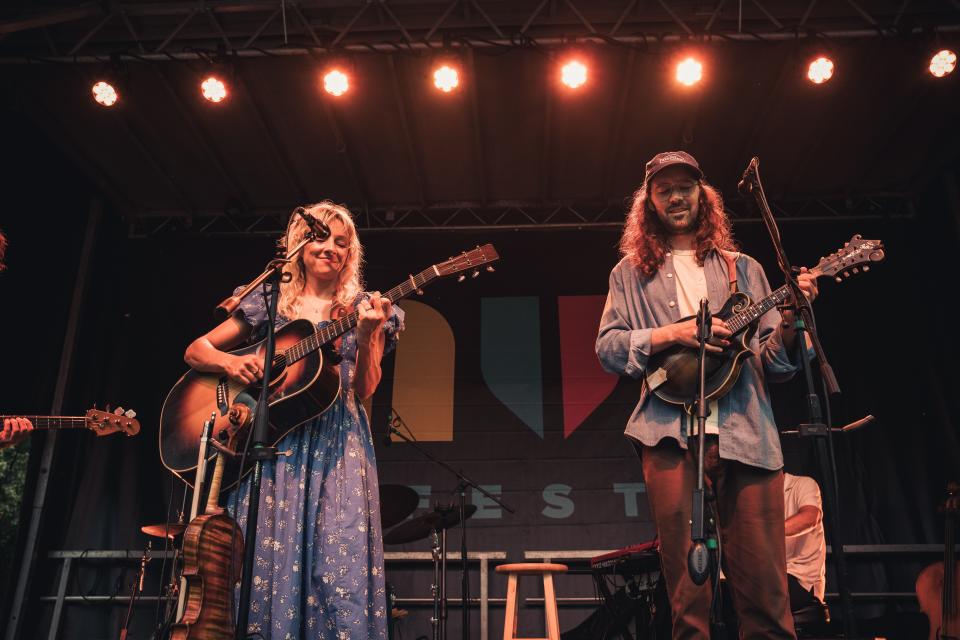
Over the weekend, even venues that reached full capacity had a steady rotation so other guests were permitted to enter as people left for other destinations, he said.
“I can’t say enough about the people who did attend. It couldn’t have been more perfect as far as attendance and participation,” Whitworth said. “Everybody was dialed in from the first night, from the first note and it felt magical.”
AVLFest’s venues varied in size from more intimate bars to outdoor concert arenas. Attendees could have different concert experiences, as well as discover local businesses surrounding them.
Musicians were exposed to new audiences and played stages they may not have otherwise, Whitworth said.
“One of the great things for me, someone who has been booking music in this town for so long, was being able to give people a chance to play stages they may not have otherwise played," he said. "Getting some of the smaller bands that are amazingly talented and full deserving but getting them on stage like The Orange Peel or Wortham Center for the Performing Arts. Getting them on stages that may seem unobtainable to them ― that’s what did it for me. That was the cherry on top.”
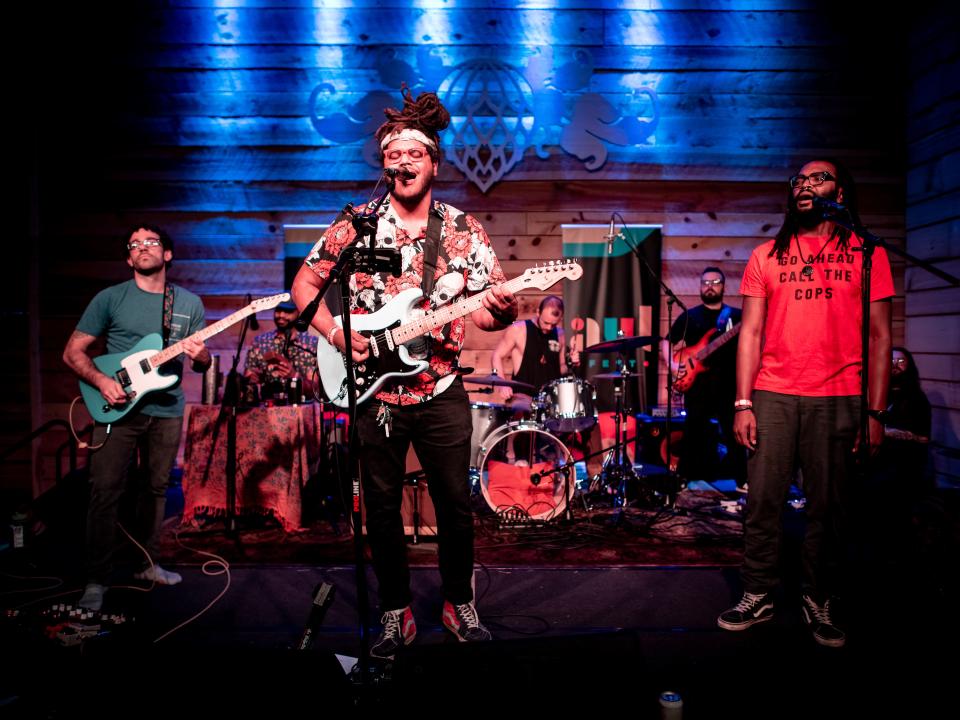
To attract Asheville area residents, discounted wristbands were sold early and for $50 ― half the price for regular admission. A goal was to make the festival accessible without people “breaking the bank,” he said.
Another method of improving accessibility was designating shuttle buses to circulate the venues. Festivalgoers were encouraged to walk or bike, or they could use other modes of transportation.
“We tried to make it as easy as possible for people to get from point A to point Z all throughout the weekend,” Whitworth said. “Also, keeping people safe and not impacting the traffic or the carbon footprint was all intentional with the shuttles we offered.”
The August dates were intentional to give local businesses a boost during a slower season, Dudasik said.
“What we set out to do, we accomplished tenfold, and the fact that we elevated businesses across the board, and that was our number one mission,” said Whitworth, who received reports from some businesses that they hit record sales. “And not just from a venue perspective but downtown business, in general, and we really felt that.”
Also, a portion of AVLFest’s proceeds is being donated to local nonprofits Black Wall Street, Campaign for Southern Equality, Homeward Bound and RiverLink.
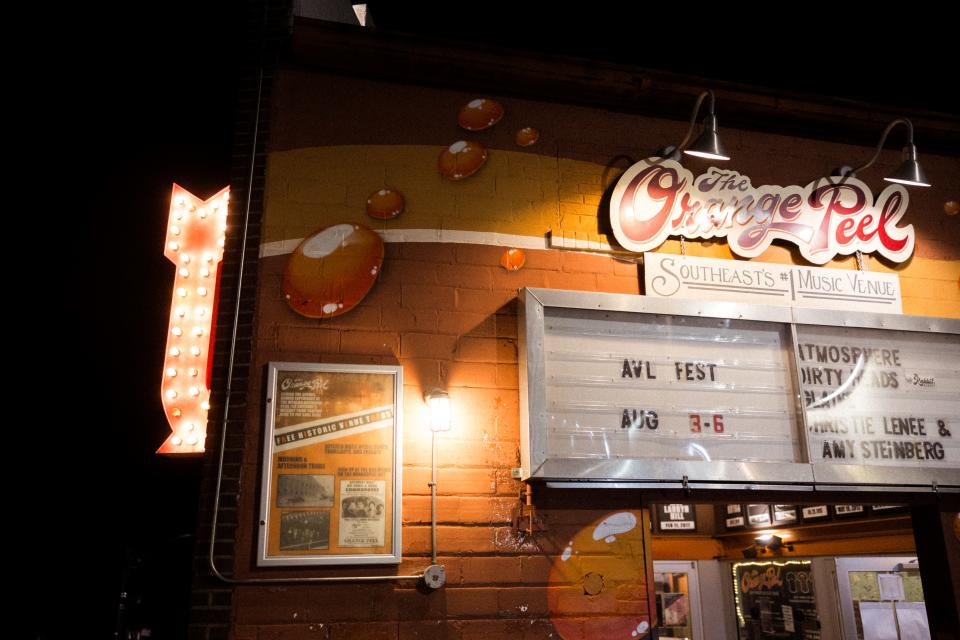
AVLFest encompassed the charm and communal spirit some may say the city has been lacking in recent years and was a great introduction to newcomers, Whitworth said.
“It felt big, but it also felt like an old-school Asheville celebration,” Dudasik said. “People who grew up here and been here for a long time said it felt like Asheville 20 years ago.”
Whitworth confirmed AVLFest will be an annual event and will return next year.
“We’ll definitely be back for year two, and I think even if this year it failed, we would be back for year two, but given the positive reception it’s gotten and how smoothly it went ― yeah, no brainer, absolutely,” Whitworth said.
AVLFest festivalgoers' experiences
Although met with uncertainty early on, the conversation shifted as the festival kicked off on Aug. 3, and by the time it wrapped up on Aug. 6, social media was abuzz with festivalgoers sharing their experiences.
Not every aspect went as planned, and there were lessons learned that organizers plan to address next year.
Some of AVLFest’s venues that are usually open to the public were closed to patrons without wristbands, leading them to either purchase a wristband or leave.
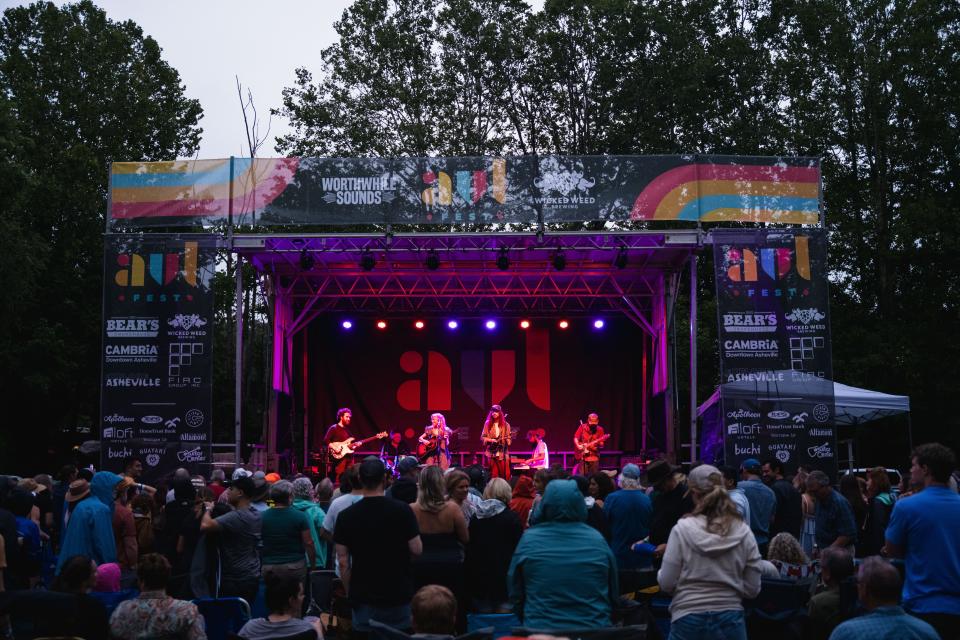
Two headliner concerts required ticket purchases not included in the wristband access but cost an additional $20 to attend.
There were guests who stumbled upon the festival and inquired and bought wristbands to attend, Dudasik said. Ticket or wristband purchasing was permitted at the venues’ doors or online on the days of the event.
Others, like Wicked Weed’s Funkatorium, cordoned off a section of its business for the special event so regular guests could still visit their taproom and restaurant.
New Belgium Brewing was the one exception to the ticketing rule. The brewery chose not to exclude its regular patrons from visiting its taproom, permitting anyone to attend the shows scheduled, Whitworth said.
“We found common ground there and agreed to let their patrons come in,” Whitworth said. “You didn’t have to have to have a wristband to go to New Belgium, and that was the one venue that was that way.”
Whitworth said the goal wasn’t to disrupt the normal flow of Asheville or its local businesses but to bring more people into their doors. The sentiment carried into the city as no road closures were required.
There were some hiccups with the flow of shuttle buses at times, Whitworth said, which he said is to be expected when shuttling nearly 7,000 people across the city. Even with a 40-minute delay, the system still worked, he said. Festivalgoers were within walking distance of other venues in most instances or had options to take other transportation.
Jen Nealy, of Asheville, and her husband attended numerous shows at five venues over the four-day festival. She wasn’t familiar with any of the acts but welcomed the opportunity to see live music and discover new acts.
“I got the early bird local pricing. A whole weekend of music for $50 4 miles from our house? Sold,” Nealy said.
Nealy met with friends and talked with other festivalgoers, many of whom were from out of town, she said.
“I was super impressed. I knew it was their first year, so I was expecting there to be some hiccups or something, but from my experience there were none,” Nealy said.
Nealy said she liked the idea of the shuttles and though she didn’t take them, knew others who had and said they were running on time and had no complaints.
“It was nice because so many of the bands were local, we’ll have opportunities to see them again,” Nealy said.
Nealy’s one critique was that the New Belgium concerts were open to everyone and that it was like a regular day at the brewery.
“Everything seemed to really work well,” Nealy said.
Nealy said she would attend AVLFest again and hopes more people will embrace it.
“Asheville’s a music town. They should absolutely keep doing this,” Nealy said.
Joe Bowman, of Weaverville, and his wife attended more than half a dozen and venues and multiple shows over the four-day stretch.
“It surpassed my expectations. I saw several bands I’d never heard before that were really good, and we had great weather and all the facilities with one exception was outstanding,” Bowman said.
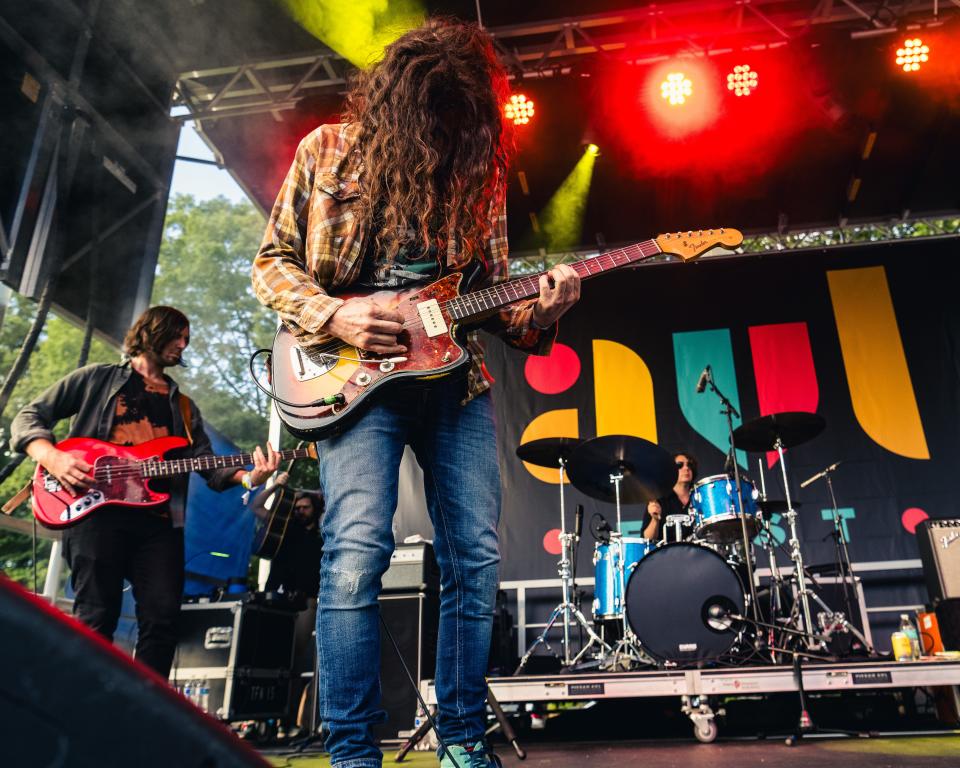
Bowman suggested AVLFest design a mobile app so festivalgoers could make a personalized schedule of shows to attend with its day, time and location.
The schedules and lineup lists posted on AVLFest’s website this year were difficult to read and navigate, he said.
One aspect that Bowman called “genius” was the Spotify playlist AVLFest organizers compiled of the featured artists that allowed him to become familiar with the music before he attended.
Bowman is already making plans to attend AVLFest 2024.
Next time, Bowman plans to ride a bike from venue to venue for added fun. And he recommends others bring an umbrella for rain and sun protection for outdoor concerts.
“I’ve already invited my son and his wife to come stay with us for the music festival next year, and we’re going to get tickets as soon as they go on sale,” Bowman said.
Food and brew news you may have missed:
New menu, venue upgrades rolls out at Asheville restaurant offering Southern bites, sips. Read more here.
Burial Beer announces opening of new concert venue, music festival in Asheville. Read more here.
River Arts District brewery opens, dares to brew something new in Asheville. Read more here.
Tiana Kennell is the food and dining reporter for the Asheville Citizen Times, part of the USA Today Network. Email her at [email protected] or follow her on Instagram @PrincessOfPage. Please support this type of journalism with a subscription to the Citizen Times.
This article originally appeared on Asheville Citizen Times: AVLFest: Was the inaugural citywide music festival a success?
